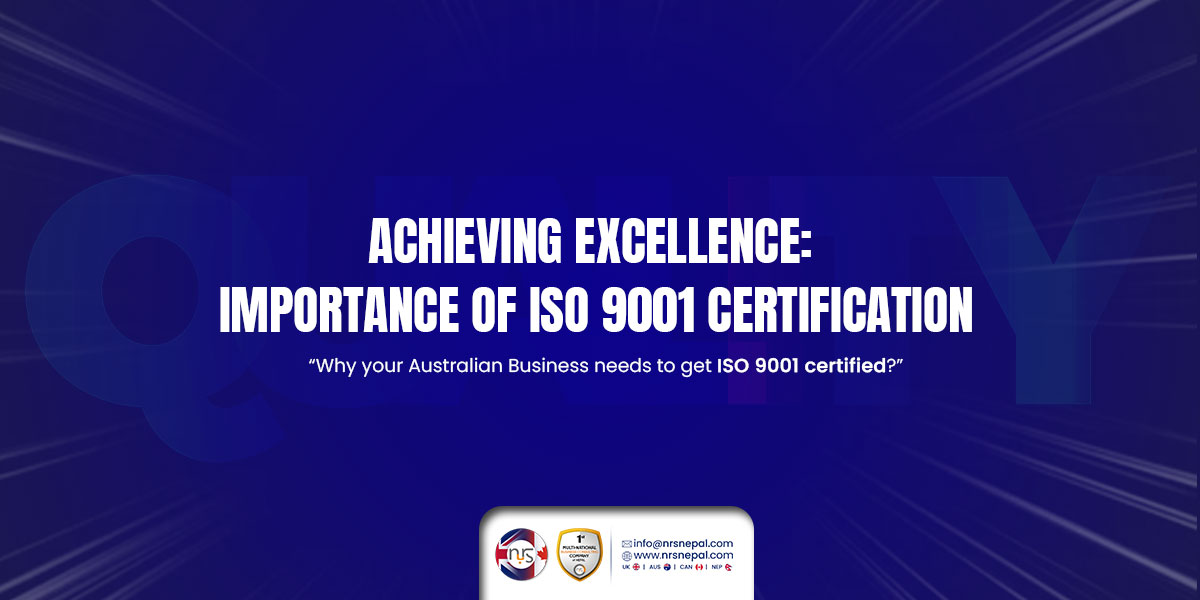
These days, offering quality products and services isn’t sufficient for clients. It's about establishing trust, ensuring reliability, and demonstrating a commitment to excellence. This is where the ISO 9001 certification becomes indispensable, and you can rely on it without hesitation. ISO 9001 is the globally recognized Quality Management Systems (QMS) standard. It provides a framework that guarantees a company's products and services consistently meet quality benchmarks and daily requirements, while continually improving operations. This enhances their performance and contributes to fulfilling customer expectations, showcasing their dedication to quality. We recognize that Australian businesses must consistently pursue excellence to differentiate themselves and thrive in the market. We will discuss how SIO 9001 comes into play further in this blog.
Why Do Australian Enterprises Need ISO 9001?
With an expanding economy, industries such as manufacturing, construction, healthcare, and professional services face growing demands to demonstrate reliability and quality. The ISO 9001 certification is frequently a prerequisite when bidding for government contracts, collaborating with major companies, or entering global markets. Besides this, it plays a major role in improving the following:
Enhance Customer Satisfaction
ISO 9001 prioritizes addressing customer requirements alongside enhancing customer satisfaction. It involves consistently delivering quality products and services. This fosters trust and loyalty, which are vital for long-term success. Getting your business ISO 9001 certified in Australia helps minimize errors and defects, leading to higher quality products and services. It also includes customer satisfaction as a key performance metric, encouraging businesses to actively seek feedback and respond to complaints effectively.
Improve Operational Efficiency
The ISO 9001 certification advocates for businesses to refine processes, minimize waste, and make the best use of resources. These results in enhanced operational performance, cost reductions, and increased productivity, all essential for staying competitive in Australia’s dynamic market. By implementing a Quality Management System (QMS) based on ISO 9001 principles, businesses can clearly define responsibilities, streamline workflows, and monitor key performance indicators. This leads to fewer errors, more consistent outcomes, and faster identification of issues before they become major problems.
Compliance and Risk Management
Australian businesses frequently encounter strict regulatory requirements. ISO 9001 consulting can assist in ensuring adherence to pertinent laws and standards. It mitigates the risk of penalties for non-compliance and bolsters the company’s reputation. A key tenet of ISO 9001 is the integration of risk-based thinking throughout the organization’s processes. Instead of depending exclusively on corrective measures post-issue, ISO 9001 certification in Australia highlights the necessity of proactively recognizing possible risks and opportunities during both planning and operational activities.
Market Access and Competitive Advantage
Numerous Australian and global clients mandate ISO 9001 certification as a condition for collaboration. Certification facilitates entry into new markets and alliances, providing companies a distinct advantage over those lacking certification. This internationally recognized standard assures customers, suppliers, and stakeholders that the company consistently meets regulatory requirements and delivers reliable products or services.
Employee Engagement and Improvement Culture
ISO 9001 fosters an environment of ongoing enhancement and employee participation. Motivated employees drive innovation and yield higher quality results, reinforcing the company internally. The standard acknowledges that workers at every level are crucial to the organization's capacity to satisfy customer needs and enhance performance.
At Nepal Realistic Solution (NRS), we recognize that every business is unique. That’s why we offer ISO 9001 solutions tailored to your specific requirements, industry, and objectives. Organizations can benefit greatly from structured quality management initiatives such as gap analysis and readiness evaluations, which help identify areas needing improvement. These efforts also foster stronger leadership, promote accountability, and lead to enhanced product and service quality